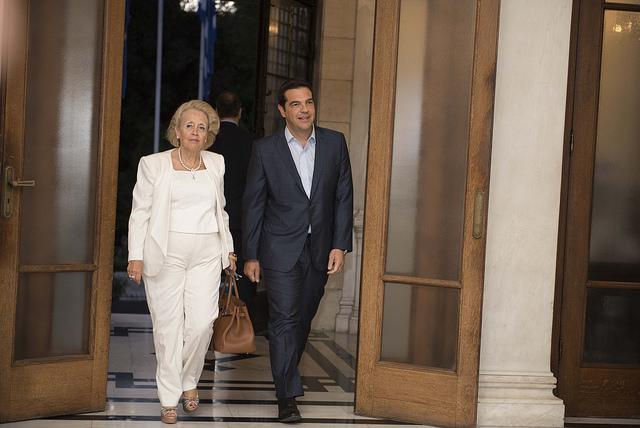Greek Prime Minister Alexis Tsipras launched his election campaign with a TV interview, which aired on 26 August and in which he defended his brief term in office. Even before the 14 August Greek Parliament vote on the third bailout package, Mr Tsipras was long expected to step down and seek early elections in the autumn. He was compelled to move swiftly after about a third of his Syriza lawmakers refused to back the reform package, robbing the now ex-Prime Minister of his parliamentary majority.
The new parliamentary elections, the second such elections this year after those of 25 January that brought Mr. Tsipras to power, will be held on 20 September. In the meantime, President Prokopis Pavlopoulos has named the first female Prime Minister the country has ever had. Vassiliki Thanou, Greece’s top Supreme Court judge, will be heading the caretaker government, which will lead the country until a new government is formed after the elections.
According to a Metron Analysis poll, Mr. Tsipras and his Syriza party is ahead of the pack with 23%, followed by the New Democracy party with 19.5%. Given that the number of undecided voters stands close to 26%, the difference between Syriza and the New Democracy party may well shrink. The extremists from the Golden Dawn party come in a distant third with 6.5%, followed by the Greek Communist Party at 5% and PASOK at 4.5%. The current for centrist To Potami (“The River”) seems to be slowing down, with only 4% of vote intentions.
Based on the same survey, 64% of Greeks believe that Mr. Tsipras was wrong to call snap elections. Yet, when gauging the public’s perception regarding the former Prime Minister, 61% of Greeks hold a positive opinion of Tsipras. Despite the favourable numbers, it is unlike that Mr. Tsipras’ popularity will translate into a majority for Syriza. Mr. Tsipras is faced with both the problem of a splinter group, Popular Unity, drawing away support from Syriza, and the very likely scenario of having to come up with a governing coalition after the elections.
Mr. Tsipras has ruled out any cooperation with the main pro-Europe opposition parties – New Democracy, To Potami and the socialist PASOK. During his 26 August interview, Mr. Tsipras made that point very clear: “I’m not going to be prime minister if it means co-operating with parties from the old political system . . . We’re not going to open a window for the return of the old parties that the people threw out of the front door”. Of course, that is pre-election talk, which Mr. Tsipras, being the pragmatist that he has proven to be, may well change or re-interpret after the elections.
It remains unclear whether during this electoral campaign Syriza will be able to pull its own weight in the wake of a new spate of defections. Relying on Mr. Tsipras’ popularity alone will not get the party very far. The Popular Unity party, led by Mr. Tsipras’ former Energy Minister Panagiotis Lafazanis, is benefiting from discontent amongst Syriza voters and supporters over what they consider to be Mr. Tsipras’ policy somersault. Popular Unity is already polling slightly above 3%, which is the threshold for representation in Parliament, while Mr. Tsipras’ government partners, the Independent Greeks, seem unable to reach the threshold this time.


